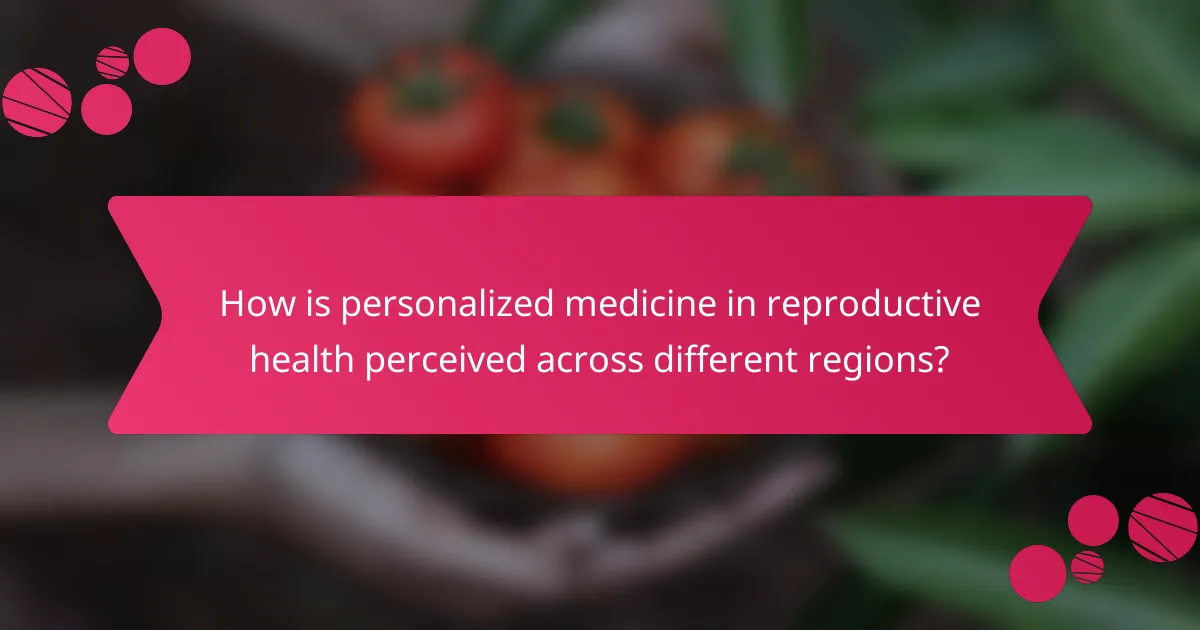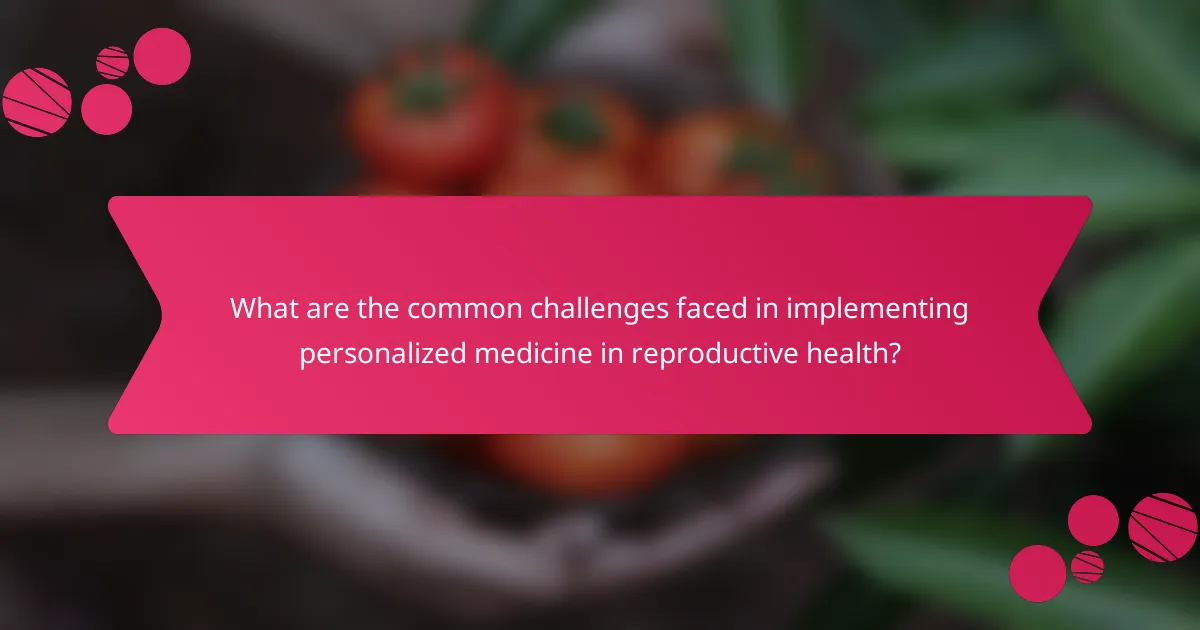Personalized medicine in reproductive health offers tailored treatments that enhance patient outcomes. This article explores key approaches like genomic profiling and hormone assessments, highlights advantages such as improved success rates in fertility treatments, and examines case studies demonstrating effective interventions. Additionally, it addresses regional perceptions and implementation challenges while discussing emerging trends shaping the future of personalized reproductive care.

What are the key principles of personalized medicine in reproductive health?
Personalized medicine in reproductive health focuses on tailored treatments based on individual genetic, environmental, and lifestyle factors. Key principles include genomic profiling, which identifies specific genetic variations influencing reproductive health; patient-centered care that emphasizes individual needs and preferences; and data integration from diverse sources to enhance decision-making. These principles aim to improve treatment efficacy and patient outcomes in reproductive health.
How do genetic factors influence reproductive health outcomes?
Genetic factors significantly influence reproductive health outcomes by affecting fertility, pregnancy complications, and congenital conditions. Specific genetic variations can determine hormone levels, ovulation patterns, and sperm quality, impacting overall reproductive success. For instance, mutations in genes related to hormone regulation can lead to conditions like polycystic ovary syndrome (PCOS), which affects many women’s fertility. Personalized medicine approaches can identify these genetic factors, allowing for tailored treatment plans that enhance reproductive health. As a result, couples can receive targeted interventions, improving their chances of conception and healthy pregnancies.
What role does patient history play in personalized reproductive care?
Patient history is crucial in personalized reproductive care as it informs tailored treatment plans. It encompasses factors like medical conditions, genetic predispositions, and lifestyle choices that influence reproductive health. By analyzing this information, healthcare providers can customize interventions, enhancing effectiveness and minimizing risks. For instance, a thorough assessment may reveal unique attributes such as hormonal imbalances or family history of infertility, guiding specific therapies. Personalized approaches lead to improved outcomes and patient satisfaction in reproductive health management.

What are the advantages of personalized medicine in reproductive health?
Personalized medicine in reproductive health offers tailored treatments, improving outcomes for individuals. It enhances patient engagement, optimizes therapeutic strategies, and reduces adverse effects. By considering genetic, environmental, and lifestyle factors, personalized approaches can lead to more effective interventions. For example, specific fertility treatments can be customized based on a patient’s genetic profile, increasing success rates.
How does personalized medicine improve treatment efficacy?
Personalized medicine improves treatment efficacy by tailoring therapies to individual patient characteristics. This approach enhances drug effectiveness and minimizes adverse effects. By analyzing genetic, environmental, and lifestyle factors, healthcare providers can select optimal treatments. Case studies show improved outcomes in reproductive health, such as increased success rates in fertility treatments.
What are the cost benefits associated with personalized reproductive health strategies?
Personalized reproductive health strategies can significantly reduce costs by enhancing treatment efficiency and minimizing unnecessary interventions. These strategies tailor medical approaches to individual patient needs, leading to better outcomes and reduced healthcare spending.
For example, personalized medicine can decrease the trial-and-error period in finding effective treatments, which often incurs high costs. Additionally, targeted therapies can lower the risk of complications, resulting in fewer hospital visits and related expenses.
Research indicates that personalized approaches in reproductive health can save patients up to 30% compared to traditional methods. This cost-effectiveness stems from optimized resource allocation and improved patient satisfaction, ultimately leading to long-term savings for both individuals and healthcare systems.
How can personalized medicine enhance patient satisfaction in reproductive health?
Personalized medicine enhances patient satisfaction in reproductive health by tailoring treatments to individual needs. This approach improves outcomes through targeted therapies, reducing trial-and-error in treatment selection. Personalized strategies can address unique patient characteristics, leading to more effective interventions and increased patient engagement. Case studies show that patients report higher satisfaction levels when their treatment plans consider personal health data and preferences.

Which approaches are commonly used in personalized reproductive health?
Personalized reproductive health commonly employs approaches such as genetic testing, hormone profiling, and lifestyle assessments. These methods tailor interventions to individual needs, enhancing treatment effectiveness. Genetic testing identifies predispositions to reproductive conditions, while hormone profiling evaluates hormonal balance. Lifestyle assessments consider factors like diet and stress, further personalizing care.
What is the role of genomics in personalized reproductive health?
Genomics plays a crucial role in personalized reproductive health by enabling tailored interventions based on individual genetic profiles. This approach enhances the understanding of fertility issues, guiding treatments such as in vitro fertilization (IVF) and genetic screening.
By analyzing genomic data, healthcare providers can identify specific genetic markers associated with reproductive conditions. This allows for customized strategies that increase the chances of successful pregnancies and reduce the risk of genetic disorders in offspring.
For instance, preimplantation genetic testing (PGT) leverages genomic insights to select embryos with the best chance of healthy development. As a result, genomics significantly improves reproductive outcomes and empowers individuals with informed choices regarding family planning.
How do lifestyle modifications integrate into personalized reproductive care?
Lifestyle modifications play a crucial role in personalized reproductive care by enhancing treatment effectiveness. Tailored lifestyle changes, such as diet, exercise, and stress management, can significantly improve reproductive outcomes. For example, a balanced diet rich in antioxidants may enhance fertility, while regular physical activity can regulate hormonal balance. Personalized approaches consider individual health profiles, leading to more effective interventions. Integrating these modifications addresses unique patient needs, promoting overall reproductive health.
What technologies are utilized for personalized reproductive health assessments?
Personalized reproductive health assessments utilize advanced technologies such as genetic testing, artificial intelligence, and wearable devices. These tools analyze individual health data to tailor assessments and treatment plans. Genetic testing identifies hereditary conditions, while AI algorithms predict outcomes based on large datasets. Wearable devices monitor physiological parameters, providing real-time insights. Together, these technologies enhance the precision and effectiveness of reproductive health care.

What unique case studies highlight the effectiveness of personalized medicine in reproductive health?
Personalized medicine in reproductive health shows effectiveness through tailored treatments based on individual genetic profiles. Case studies demonstrate improved outcomes in fertility treatments and prenatal care. For instance, a study revealed that women receiving personalized hormone therapy had a 30% higher success rate in IVF cycles. Another case highlighted the use of genetic screening to identify risks for hereditary conditions, leading to informed decisions and healthier pregnancies. These examples underscore the potential of personalized approaches to enhance reproductive health outcomes significantly.
Which success stories demonstrate improved fertility outcomes through personalized approaches?
Personalized approaches have led to improved fertility outcomes in various success stories. One notable case involved a couple who underwent a tailored treatment plan that included genetic screening and lifestyle modifications. This personalized medicine approach resulted in a successful pregnancy after multiple unsuccessful attempts. Another example is a fertility clinic that implemented individualized hormone therapy based on patient-specific biomarkers, achieving a higher success rate in in vitro fertilization (IVF) cycles. These cases demonstrate the effectiveness of personalized medicine in enhancing reproductive health outcomes.
What lessons can be learned from failed personalized medicine interventions in reproductive health?
Failed personalized medicine interventions in reproductive health reveal critical lessons for future approaches. Key insights include the necessity for robust patient data, the importance of interdisciplinary collaboration, and the need for clear communication of risks and benefits.
1. Comprehensive data collection is vital to tailor treatments effectively. Incomplete or biased data can lead to ineffective interventions.
2. Collaboration among healthcare professionals, geneticists, and bioethicists enhances the development of personalized strategies, ensuring diverse perspectives are considered.
3. Transparent communication with patients regarding potential outcomes fosters trust and encourages informed decision-making.
These lessons emphasize the importance of a well-rounded approach to personalized medicine in reproductive health, addressing both scientific and human factors.

How is personalized medicine in reproductive health perceived across different regions?
Personalized medicine in reproductive health is perceived positively across various regions, with notable differences in implementation and acceptance. In North America, it is embraced for its potential to enhance fertility outcomes through tailored treatments. In Europe, regulatory frameworks support its integration, but ethical concerns arise regarding genetic interventions. In Asia, cultural beliefs influence perceptions, leading to a cautious approach. Meanwhile, in Africa, limited access to technology hampers widespread adoption, despite enthusiasm for personalized approaches. Each region highlights unique attributes affecting the overall perception and application of personalized medicine in reproductive health.
What cultural factors influence the acceptance of personalized reproductive health solutions?
Cultural factors significantly influence the acceptance of personalized reproductive health solutions. Societal norms, religious beliefs, and healthcare access shape perceptions and willingness to adopt these innovations.
For example, communities with strong traditional values may resist personalized approaches due to skepticism toward modern medicine. Conversely, cultures that prioritize individual health autonomy tend to embrace personalized solutions more readily.
Education levels also play a role; higher awareness of personalized medicine correlates with greater acceptance. Additionally, the influence of healthcare providers can either facilitate or hinder acceptance, depending on their attitudes toward personalized reproductive health.
Finally, cultural narratives around fertility and family planning impact how these solutions are perceived and utilized, leading to diverse acceptance levels across different populations.
How do regulations impact the implementation of personalized medicine in reproductive health globally?
Regulations significantly influence the implementation of personalized medicine in reproductive health by establishing guidelines that govern research, data privacy, and clinical practices. These regulations can either facilitate innovation or create barriers based on their stringency and adaptability. For instance, countries with supportive regulatory frameworks encourage the development of personalized treatments, enhancing patient outcomes. Conversely, stringent regulations may delay the introduction of new therapies, impacting global accessibility. Additionally, ethical considerations in genetic testing and data usage shape how personalized medicine is integrated into reproductive health services, highlighting the need for balanced regulatory approaches.

What are the common challenges faced in implementing personalized medicine in reproductive health?
Implementing personalized medicine in reproductive health faces several challenges. Key obstacles include the complexity of genetic data interpretation, the need for interdisciplinary collaboration, and ethical considerations regarding patient privacy. Additionally, access to advanced technologies and the integration of personalized approaches into existing healthcare systems can be problematic. These factors can hinder the effective application of personalized medicine strategies in reproductive health settings.
How do data privacy concerns affect personalized reproductive health practices?
Data privacy concerns significantly hinder the adoption of personalized reproductive health practices. Patients often hesitate to share sensitive information, fearing misuse or breaches. This reluctance can limit the effectiveness of tailored treatments, as comprehensive data is essential for personalized approaches. Additionally, regulatory frameworks may impose restrictions, further complicating data sharing. As a result, healthcare providers must balance personalization with robust privacy measures to foster trust and enhance patient engagement.
What are the barriers to accessing personalized reproductive health services?
Barriers to accessing personalized reproductive health services include high costs, limited availability, lack of awareness, and inadequate insurance coverage. These factors hinder individuals from receiving tailored care that meets their unique reproductive health needs. Access issues often arise from socioeconomic disparities, geographic limitations, and insufficient healthcare infrastructure.

What are the emerging trends in personalized medicine for reproductive health in 2025?
Emerging trends in personalized medicine for reproductive health in 2025 include advanced genetic testing, AI-driven treatment plans, and integration of lifestyle data. These innovations enhance targeted therapies and improve patient outcomes. Genetic testing will allow for tailored interventions based on individual DNA profiles, while AI can analyze vast data to recommend personalized care strategies. Additionally, incorporating lifestyle factors will further refine treatment approaches, addressing unique patient needs.
How are artificial intelligence and machine learning shaping personalized reproductive care?
Artificial intelligence and machine learning are revolutionizing personalized reproductive care by providing tailored treatment plans. These technologies analyze patient data to predict outcomes and suggest individualized interventions. For instance, AI algorithms can assess genetic information and lifestyle factors, optimizing fertility treatments. Machine learning models improve success rates by identifying patterns in treatment responses, allowing clinicians to offer more precise care. This approach enhances patient engagement and satisfaction, as treatments become more aligned with individual needs.
What future innovations can we expect in personalized reproductive health solutions?
Future innovations in personalized reproductive health solutions will focus on advanced genetic testing, AI-driven analytics, and tailored treatment plans. These developments aim to enhance individual patient outcomes through precision medicine. For instance, genetic profiling can identify specific fertility issues, allowing for customized interventions. Additionally, AI can analyze vast datasets to predict treatment success rates based on unique patient profiles. As a result, patients will receive more effective and personalized care, minimizing trial and error in reproductive health treatments.
What best practices should healthcare providers follow for effective personalized reproductive health care?
Healthcare providers should prioritize patient-centered communication, data integration, and individualized treatment plans for effective personalized reproductive health care. Understanding patient history and preferences enhances care quality. Utilizing genetic and hormonal data leads to tailored interventions. Regular follow-ups and adaptability to changing patient needs are crucial for success.
